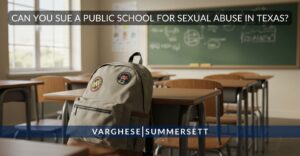Texas Chief Justice: Zoom is Here to Stay
March 24, 2021
Texas’ Supreme Court Chief Justice delivered his state of the Judiciary speech yesterday. What was the big takeaway? Zoom is here to stay for court proceedings.
On Tuesday, Chief Justice Nathan Hecht delivered his biennial State of Judiciary address and called on the Texas legislature to update laws to ensure remote access to courtrooms will continue long after the coronavirus is tamed.
Hecht said an “unexpected benefit” of switching to remote proceedings was increased participation in the legal process.
He said the remote proceeding are more efficient and cost-effective and will continue to play a role in the “new normal.”
According to Hecht, appearance rates in high-volume dockets, such as traffic cases and child custody cases, went from 80 percent no-shows to 80-percent appearances during the pandemic. He said people limited by income, child care, transportation or job needs were able to go to court by clicking on a link or dialing on a smart phone.
Another advantage to remote proceedings? You can watch them online, he said, giving the public a ringside seat in every courtroom, increasing transparency and accountability.
However, Hecht acknowledged that felonies and complex criminal matters that require jury trials can’t be handled remotely. He said jury trial dockets are backlogged and will take three years to catch up.
In 2019, Texas courts tried roughly 9000 cases to verdict. In the past year of the pandemic, only 239 were tried.
Hecht said he asked the Legislature for increased funding for courts to allow safe in-person jury trials and visiting and retired former judges to help decongest dockets.
The chief justice also outlined a number of other legislative priorities. He renewed his previous calls to reform the cash bail system. He said the current system allows potentially dangerous defendants with more money to await trial out of jail, while incarcerating low-risk defendants facing minor offenses who simple can’t afford bail.
Finally, Hecht said the justice system would begin collecting data and self-reflect on potential racial biases in the justice system and encourage better training for judges.
Hecht’s State of the Judiciary speech – which is normally delivered to a joint session of the legislature – was instead streamed online yesterday.
That’s a true sign of the times.
Mass Shooting: Colorado Grocery Store
March 23, 2021
Ten people were killed in a mass shooting yesterday at a Colorado grocery store, rekindling the debate about guns in the United States.
On Monday, a gunman opened fire at a grocery store in Boulder, killing 10 people – including a police officer.
A suspect carrying a long gun was arrested, but his name and a possible motive has not yet been released.
The shooting comes on the heels of last week’s spree in Georgia, which left eight people dead – six of them of Asian descent.
The back-to-back mass shootings have already spurred a discussion about gun control in the U.S.
In Colorado, people are allowed to carry guns into businesses as long as they are in plain view. But in 2019, the grocery store where the latest shooting occurred asked shoppers to “no longer openly carry firearms” inside.
So, what is the law on open carry in Texas?
Texas permits open carry of long guns, including assault-styled guns, in public places, except in places where it is specifically prohibited by law, including courthouses, schools, polling places and racetracks. No license is required.
Private businesses, however, may ban guns from their premises by posting a sign.
As for handguns, license holders may openly carry them in non-prohibited places as long as they are secured in a hip or shoulder holster.
It’s also important to point out that Texas laws also allows people to shoot in self-defense or defense of others.
For example, back in 2019, a gunman opened fire inside a Fort Worth-area church and fatally shot two people before being killed by an armed member of the congregation’s security team. In Texas, licensed handgun owners are also allowed to carry in places of worship.
In the coming days, we expect to hear a lot of debate about gun control across the United States.
Well, keep you posted on any proposed changes, especially in Texas.
Online Solicitation Stings: Legal or Entrapment?
March 22, 2021
Six people were recently arrested in Tarrant County during an undercover online child solicitation sting.
Are these types of operations legal or entrapment?
On Friday, several adults were jailed after undercover investigators posing as minors used personal ads and social media to communicate with them about having sexual relations.
The suspects were all charged with online solicitation of a minor.
Online solicitation is a serious felony offense in Texas that occurs when an adult communicates with a person under age 17 – or someone who the adult believes is a under 17 – and has a sexual explicit conversation, sends a sexually explicit picture or video, or asks to meet the minor to engage in sexual contact.
Online solicitation is generally a third-degree felony punishable by 2 to 10 years in prison. However, it can be a second-degree felony, punishable to 2 to 20 years in prison, if the alleged “victim” is under age 14.
To many, the most surprising fact about this offense is that suspects are often arrested and charged with online solicitation of a minor even if they never had contact with an actual child.
In fact, most online solicitation charges stem from an undercover officer posing as a minor using a website or app to lure in suspects.
That’s precisely what happened last week, which was a joint operation between the Tarrant County Sheriff’s Department, Arlington Police Department and the Texas Department of Public Safety.
Many people charged with this crime want to argue entrapment or that they were set up by the undercover detectives.
That is not a viable defense in Texas. Police, themselves, are not engaging in illegal activity. In September 2015, the Texas legislature made amendments to the law and established that it is not a defense if the actor never intended for the meeting to happen.
In other words, mere conversations with an undercover agent are often enough for a conviction. Most importantly, the police are allowed to lie during these investigations.
For example, if the actor asks the person on the other end of a chat if they are a police officer, the officer can – and will – lie and say “no.” Additionally, the alleged actors never have to leave home to meet up with the victim. Officer can obtain Internet service provider records to determine the suspects identity and location.



